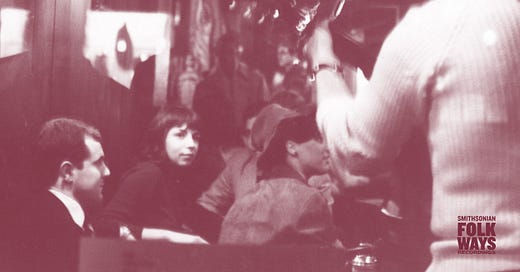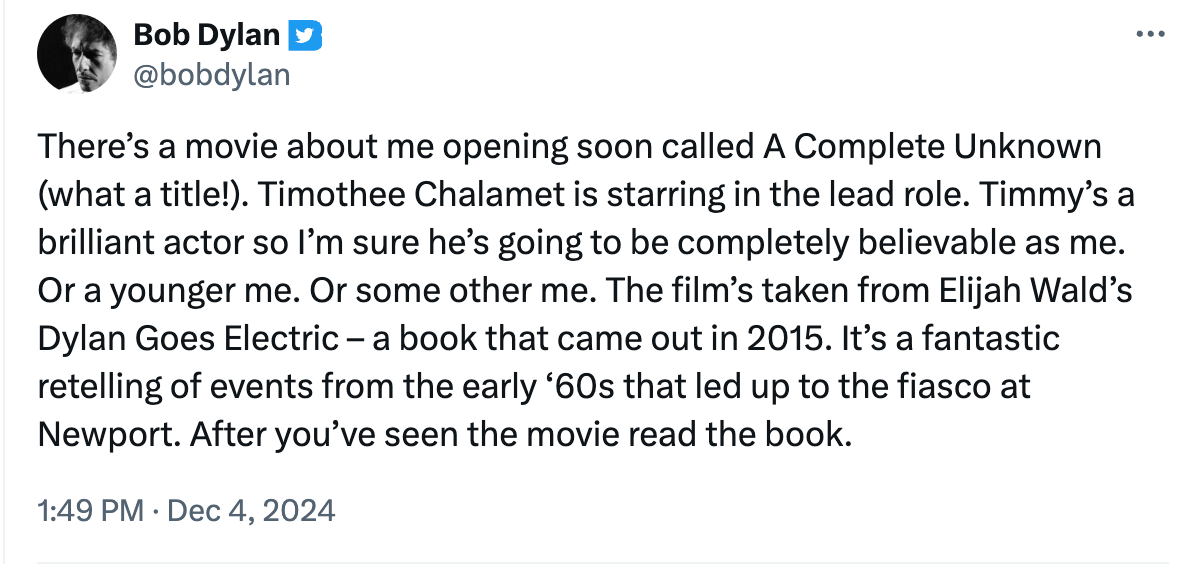Elijah Wald Shares a 'Complete Unknown' Listening Playlist
31 tracks from the Smithsonian Folkways collection
Flagging Down the Double E’s is an email newsletter exploring Bob Dylan concerts throughout history. Some installments are free, some are for paid subscribers only. Sign up here:
Next week, the Bob Dylan biopic A Complete Unknown finally hits theaters. The film was adapted from author Elijah Wald’s 2015 book Dylan Goes Electric!: Newport, Seeger, Dylan, and the Night That Split the Sixties. As I mentioned a couple weeks ago on social media, Wald’s book is an excellent read that’s very much worth your time even if (maybe especially if) you’re someone inclined, like me, to think “ehh I already know that story pretty well.” It’s one of the best Dylan books I’ve read.
But don’t take my word for it. You know who else thinks you should read it?
In advance of the movie, Wald compiled a 31-song playlist from the Smithsonian Folkways archives and wrote some notes to accompany it, both of which I’m happy to share exclusively below.
Wald’s Folkways playlist is a great listen to immerse yourself in the Greenwich Village of the 1960s. You’ll hear several of Dylan’s earliest recordings—under the alias “Blind Boy Grunt”—alongside many of his peers and influences on that early Village scene. You’ll hear songs Dylan heard and then covered himself (“Fixin’ to Die,” “Corinna Corinna,” “See that My Grave Is Kept Clean”), songs he borrowed melodies from for his own words (“Lord Randall,” “The Patriot Game,” “1913 Massacre”), as well as covers of his own early compositions. That includes the very first recording of “Blowin’ in the Wind.” No, it wasn’t Dylan’s, or Peter Paul and Mary’s for that matter. The first “Blowin’ in the Wind” the world heard came from vocal group The New World Singers (which I spoke to the late great Happy Traum about in my own book).
Listen to the playlist on your platform of choice while you read Wald’s essay:
Spotify | Apple Music | YouTube | Tidal | Pandora | Smithsonian Folkways
A Complete Unknown: A Listening Companion from Smithsonian Folkways
Written & Curated by Elijah Wald
"I envisioned myself recording for Folkways Records. That was the label I wanted to be on. That was the label that put out all the great records."
—Bob Dylan, Chronicles: Volume 1
From the moment he took an interest in folk music, Bob Dylan was intimately engaged with Folkways Records, and that engagement continued throughout his early years in New York and on to the present day. He learned songs from Folkways LPs, wrote songs based on material he’d heard on Folkways, had friends who recorded for Folkways, and eventually, he and others recorded his own songs for the label.
This playlist touches all those bases and, while following Dylan’s journey, gives a sense of the breadth of his influences and the Folkways catalog. Much of the material is from Black tradition, a reminder that before Dylan turned to acoustic folk styles, he was deeply immersed in the rhythm and blues he heard on late-night radio shows, and he first impressed New York audiences and tastemakers as a distinctive young blues artist, a white singer who channeled the spirit of that tradition while reshaping it to fit his own voice and experiences.
When he reached Minneapolis, Dylan discovered a wide range of traditional styles, most notably the Southwestern tradition of Woody Guthrie, which was being carried on by younger artists like Ramblin’ Jack Elliott. He was also attuned to the music of the rural South that was being collected and explored by musicians like Mike Seeger of the New Lost City Ramblers. They inspired him to head for New York, where he was befriended by local leading lights like Dave Van Ronk, and, on a side trip to Cambridge, Massachusetts, Eric Von Schmidt. For a while, he worked as a harmonica sideman, reworking Sonny Terry’s licks and collaborating with everyone from Harry Belafonte to the Delta bluesman Big Joe Williams.
Dylan’s early repertoire was a dazzling mix of styles—his first albums, released on Columbia Records, included versions of Jesse Fuller’s “Crazy ’Bout a Woman,” Booker White’s “Fixin’ to Die,” old southern standards like “Corrine, Corrina,” and songs learned from Guthrie and the Carter Family. He soon began adapting and reworking those songs, melding his own lyrics and experiences with traditional tunes and themes: the wistful ballad of “Scarborough Fair” became an evocation of his past in the “north country” of Minnesota; an Irish rebel song, “The Patriot Game,” became a meditation on nationalist exceptionalism, “With God on Our Side.”
When Broadside magazine sparked a new wave of topical songwriting, Dylan leapt to the forefront of a generation of young songwriters, people like Len Chandler, Phil Ochs, and Peter La Farge, who were inspired by the earlier protest songs of Guthrie and Seeger and the new wave of songs coming out of the Civil Rights movement—and he even recorded for Folkways’ Broadside compilations under the pseudonym Blind Boy Grunt. Other singers quickly picked up on his compositions: in 1962 the New World Singers made a first recording of “Blowin’ in the Wind,” and soon his songs were traveling around the world, sung in myriad styles and languages.
In 1965, Dylan famously broke with the folk scene by going electric at the Newport Folk Festival—but even in that moment, he signaled his break with a ferocious electric variant on an old song recorded in the 1920s by the Bently Brothers, “Down on Penny’s Farm.” Sixty years later, he continues to revisit and extend the traditions he absorbed in his youth, listening to these recordings, hanging out with the people who were making them, and adding his own chapters to the Folkways story.
Thanks to Elijah Wald and Smithsonian Folkways! Here’s the Spotify version again (and links to the playlist on other platforms) and the track list:
Spotify | Apple Music | YouTube | Tidal | Pandora | Smithsonian Folkways
Track List:
Bukka White – Fixin’ to Die
Mance Lipscomb – Corrine, Corrina
The Carter Family – John Hardy Was a Desperate Little Man
Jean Ritchie – Lord Randall
Bascom Lamar Lunsford – Mole in the Ground
Sonny Terry – Lost John
Woody Guthrie – Mean Talking Blues
Blind Lemon Jefferson – See That My Grave Is Kept Clean
Lead Belly, Woody Guthrie, Sonny Terry – We Shall Be Free
Audrey Coppard – Scarborough Fair
Big Joe Williams – Baby, Please Don’t Go
Lightnin’ Hopkins – Mojo Hand
Jesse Fuller – Crazy About a Woman
Harvey Andrews – The Patriot Game
The Bently Boys – Down on Penny’s Farm
Pete Seeger – Wimoweh
Mike Seeger – Man of Constant Sorrow
Eric Von Schmidt – He Was a Friend of Mine
Dave Van Ronk – Wining Boy
Ramblin’ Jack Elliott – So Long, It’s Been Good to Know You
Pete Seeger – Wasn’t that a Time
Woody Guthrie – 1913 Massacre
Bob Dylan (Blind Boy Grunt) – Only a Hobo
New World Singers – Blowin’ In the Wind
The Freedom Singers – We Shall Overcome
Phil Ochs – Ballad of William Worthy
Len Chandler – Father’s Grave
Peter La Farge – Ira Hayes
Bob Dylan (Blind Boy Grunt) – Train A-Travelin'
Nina Simone – Mississippi Goddamn
Dave Van Ronk – Buckets of Rain





Amazeballs. This gets me so pumped for the new biopic. If it's half as good as Walk the Line it's a win for everyone. Thanks for this!
Hey Ray. Have you seen all these?great stuff
https://open.substack.com/pub/johnnogowski/p/getting-caught-up-with-dylan-on-film?r=7pf7u&utm_medium=ios